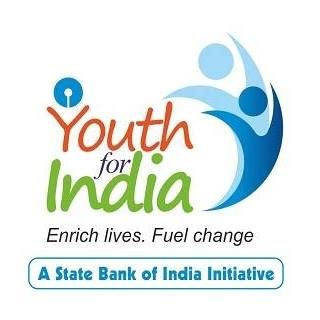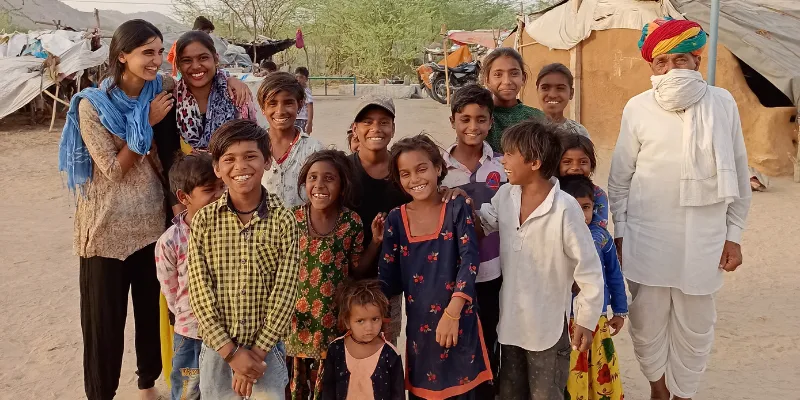
SBI Youth for India
View Brand PublisherHow Rajasthan’s Kalbeliya community inspired SBI Youth for India Fellow Viveka Advani to strive for change
SBI Foundation’s flagship initiative SBI Youth for India Fellowship, is a one-of-a-kind rural development fellowship programme managed in partnership with several global and national NGOs.
Viveka Advani believes it was fate that led her to live in Rajasthan with the Kalbeliya community. Born in the US, she has lived there for most of her life and pursued a degree in mathematics. The 25-year-old had no intention of getting into social work until a few months ago.
However, it seemed that fate had other plans. While shooting videos for an organisation near Chesapeake Bay in the US, Viveka first became interested in water security issues.
“Back in the US, if there is a single incident involving coal ash, everybody flips out. During a trip to Kolkata in 2020, I saw the state of the Hooghly and freaked out. I wanted to find out if it was a one-off incident or were other rivers in India suffering the same fate. So, I decided to go see the Yamuna in Delhi,” says Viveka, who is an Overseas Citizen of India. (OCI)
What followed was a ‘random conversation’ on a ride on the Delhi Metro that led Viveka into making a life-changing decision. She said that a woman passenger on the Metro told her about the SBI Youth For India (YFI) Fellowship and how the initiative supports efforts to impact the country’s rural environment.
“I was still keen on working on water security issues, and then COVID-19 happened, and all my plans were put on hold. I decided that if I were going to be in India, I could apply for the SBI Youth for India fellowship. Eventually, I got selected,” she adds.
Viveka was then assigned to work with Barefoot College (SWRC), an NGO working with rural communities in the arid villages of Rajasthan.
“I was very keen to see the ground reality of the country and the way things are. I was still pretty focused on water security and other issues surrounding that. During one of my field visits, I was introduced to the Kalbeliya community near the Mohanpura village. It was then that I realised that it was less about what I wanted to do and more about what they needed,” says Viveka, who now lives and works with the erstwhile nomadic community in Tilonia, a village in Ajmer district of Rajasthan.
Like most nomadic or formerly nomadic communities across the country, the Kalbeliyas face a lot of discrimination because of society’s pre-conceived notions. So, it took Viveka time to establish a level of comfort with them.
A change in perspective
“After I met the community members, all notions that I had about water security and what I thought was development work went out of the window. I decided I needed to work with them and understand what they wanted,” she says while explaining that the realisation came after multiple conversations over hot cups of ‘chai’.

“The initial conversations were around electricity supply because they lived on grazing land, which wasn’t their own. They don’t have a legal water source either. The NGO Barefoot College (SWRC) works to bring electricity to villages using solar power in a decentralised way. But, the pandemic interfered with all our plans,” says Viveka, adding that cultural perceptions also impacted their progress.
The NGO team was keen to find a woman who could be trained to make solar panels for electrification and train other women. However, women were going out and begging in the city or working in marble factories and farms. Still, for women, the idea of going out for a regular job was not taken seriously and sometimes, it was even frowned upon.
After holding various discussions with the community in order to understand and gauge what they required help with,it was suggested that education would be an area that could surely use a new perspective.
“Even before the pandemic, the children were barely going to school. Some would go with their parents to work, while others had to take care of their younger siblings when their parents left for work. One of the main reasons behind their low attendance was the horrific discrimination and taunts they were subjected to whenever they did attend the classes,” says Viveka.
Barefoot College (SWRC) through its Night Schools model has successfully conducted classes in the communities it works with for decades, and the model has reaped rich rewards. When the project was initiated in the Kalbeliya community, two children studying in Class IX and Class VII, volunteered to help the NGO educate the younger kids.
“We hoped that this would eventually make the community more open to the idea of solar mamas,” says Viveka.
Overcoming challenges
She says that many children struggle with primary literacy and letter recognition, but many others, including girls, have shown an interest in getting mainstream jobs. The children are being taught reading and basic arithmetic. They are also being taught crafts and are working on STEM projects like making cars from plastic bottles.
“There is a lot of excitement when they learn something new. It’s endearing that they are now trying to help each other, which is far more impactful than me teaching them,” she adds.
Viveka says that one of her main sources of inspiration is a 15-year-old girl Mita*, who helps her teach other students. “She is determined to finish her education and do something with her life. Her father wants her to quit her education and help at home. She also faces the ire of the so-called upper caste students in her class but is determined to finish her Board exams and study further.”
“I wish more women in the community would become like her and say that despite the naysayers, they are going to do things they want to do. These are incredible women. If they collectively have that confidence and help each other out, then they could easily appear for exams and fill out forms for applying to a job,” she says when asked about what her hopes were for the community.
Talking about what she has learned from SBI Youth for India Fellowship, Viveka says, “This rural India fellowship gives you the time and space to be with the communities you are working with while observing and understanding them. This has been an eye-opening experience for me.”
You can apply for the SBI Youth For India Fellowship by applying here by April 30, 2021. (The 1st stage of the application process can be completed in just 10 minutes, even on your phone)







